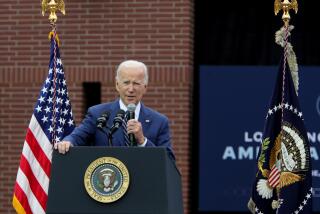Popular Generic Drugs Face FDA Testing
- Share via
WASHINGTON — The Food and Drug Administration announced Wednesday that it is conducting comprehensive tests of the 30 most-prescribed generic drugs and their patented counterparts following allegations that pharmaceutical companies provided false test data.
The agency said it expects to analyze more than 1,000 samples from hundreds of companies for potency, rate of dissolution in the body and chemical composition because of recent revelations that some companies falsified required test data to win approval to sell their generic drugs.
The announcement followed disclosure that the agency’s governmental parent, the Department of Health and Human Services, had streamlined procedures to deal with serious violations of the Food, Drug and Cosmetic Act.
Samples will be collected from all manufacturers and private-label distributors of the 30 drugs, the agency reported. About half are already in hand.
Recalls if Necessary
The tests, which began Monday, may take several weeks, and “if any safety problem arises in either a generic or brand-name product, an announcement and recall will be promptly made,” the agency said.
The 30 generic drugs being tested cover about three-fourths of new prescriptions for generics, the agency said.
The department’s inspector general has been given authority to investigate violations, something the FDA previously handled itself. If the inspector general suspects that a felony has been committed, he can get in touch with the appropriate U.S. attorney directly, spokeswoman Judy Holtz said.
So far, executives of three generic drug companies and three FDA chemists have pleaded guilty to an assortment of illegal gratuity charges.
The FDA has been under pressure from Capitol Hill, especially the House Energy and Commerce investigations subcommittee chaired by Rep. John D. Dingell (D-Mich.) to clean up the generic drug division.
Dingell’s investigators were the first to uncover the problems at the FDA division and turned their information over to the U.S. attorney’s office in Baltimore, which is continuing to investigate.
Prescription drugs must undergo grueling tests ending in human trials to prove that they are safe and effective before they can be sold. New drugs are patented, and may be sold only by the holder of the patent, a temporary monopoly.
When patents expire, any company is free to make the drug, and several companies frequently will compete to sell the same product, which pushes down prices.
The agency requires simpler tests to approve the unpatented generic drugs, a showing that the generic drug has the same biological activity as the patented kind.
Some companies reportedly have substituted the patented drug for the generic drug in these tests, winding up with a test of the patented drug against itself, almost a guarantee of equivalent biological activity.
More to Read
Sign up for Essential California
The most important California stories and recommendations in your inbox every morning.
You may occasionally receive promotional content from the Los Angeles Times.













